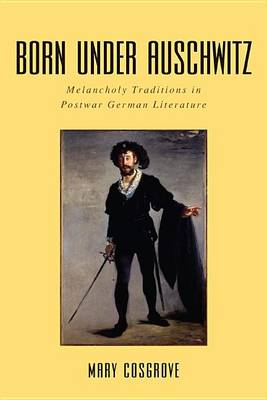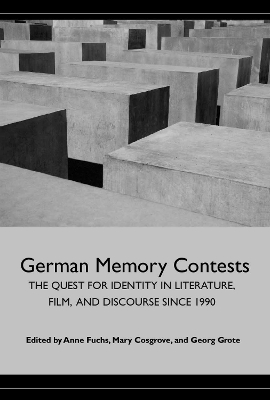Studies in German Literature, Linguistics, and Culture
2 total works
Born Under Auschwitz: Melancholy Traditions in Postwar German Literature
by Mary Cosgrove
Published 1 January 2014
In German Studies the literary phenomenon of melancholy, which has a longstanding and diverse history in European letters, has typically been associated with the Early Modern and Baroque periods, Romanticism, and the crisis of modernity. This association, alongside the dominant psychoanalytical view of melancholy in German memory discourses since the 1960s, has led to its neglect as an important literary mode in postwar German literature, a situation the present book seeks to redress by identifying and analyzing epochal postwar works that use melancholy traditions to comment on German history in the aftermath of the Holocaust. It focuses on five writers - Gunter Grass, Wolfgang Hildesheimer, Peter Weiss, W. G. Sebald, and Iris Hanika - who reflect on the legacy of Auschwitz as intellectuals trying to negotiate a relationship to the past based on the stigma of belonging to a perpetrator collective (Grass, Sebald, Hanika) or, broadly speaking, to the victim collective (Weiss, Hildesheimer), in order to develop a melancholy ethics of memory for the Holocaust and the Nazi past. It will appeal to scholars and students of German Studies, Comparative Literature, Cultural Studies, Cultural Memory, and Holocaust Studies.
Mary Cosgrove is Reader in German at the University of Edinburgh.
Mary Cosgrove is Reader in German at the University of Edinburgh.
Since unification in 1990, Germany has seen a boom in the confrontation with memory, evident in a sharp increase in novels, films, autobiographies, and other forms of public discourse that engage with the long-term effects of National Socialism across generations. Taking issue with the concept of "Vergangenheitsbewaltigung," or coming to terms with the Nazi past, which after 1945 guided nearly all debate on the topic, the contributors to this volume view contemporary German culture through the more dynamic concept of "memory contests," which sees all forms of memory, public or private, as ongoing processes of negotiating identity in the present. Touching on gender, generations, memory and postmemory, trauma theory, ethnicity, historiography, and family narrative, the contributions offer a comprehensive picture of current German memory debates, in so doing shedding light on the struggle to construct a Germanidentity mindful of but not wholly defined by the horrors of National Socialism and the Holocaust.
Contributors: Peter Fritzsche, Anne Fuchs, Elizabeth Boa, Stefan Willer, Chloe E. M. Paver, Matthias Fiedler, J. J. Long, Dagmar C. G. Lorenz, Cathy S. Gelbin, Jennifer E. Michaels, Mary Cosgrove, Andrew Plowman, Roger Woods.
Anne Fuchs is Professor of Modern German literature and Georg Grote is Lecturer in German history, both at University College Dublin. Mary Cosgrove is Lecturer in German at the University of Edinburgh.
Contributors: Peter Fritzsche, Anne Fuchs, Elizabeth Boa, Stefan Willer, Chloe E. M. Paver, Matthias Fiedler, J. J. Long, Dagmar C. G. Lorenz, Cathy S. Gelbin, Jennifer E. Michaels, Mary Cosgrove, Andrew Plowman, Roger Woods.
Anne Fuchs is Professor of Modern German literature and Georg Grote is Lecturer in German history, both at University College Dublin. Mary Cosgrove is Lecturer in German at the University of Edinburgh.

